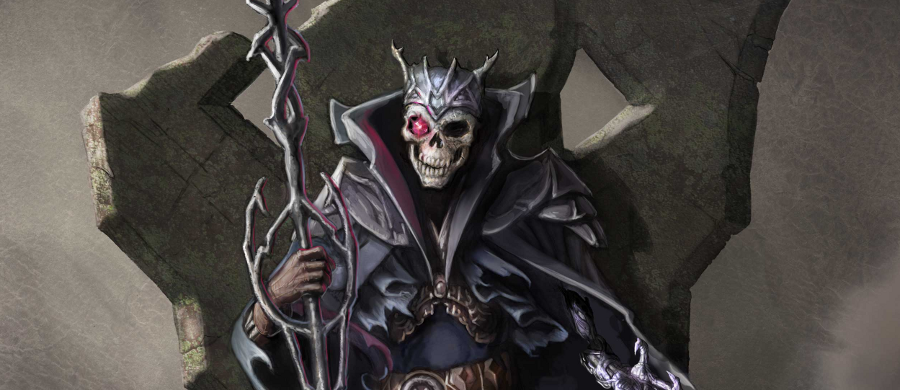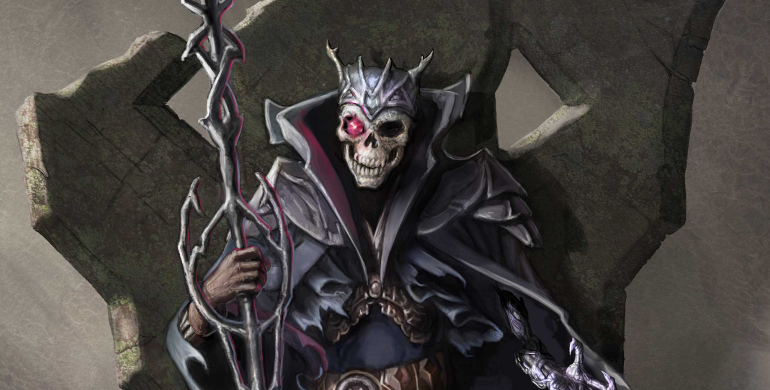Under the Wire: D&D In Short Sessions
 Lich King, Pelgrane Press Ltd
Lich King, Pelgrane Press Ltd
My gaming group started with a large six hour chunk carved out of each Sunday to play make believe. While the quality of our games certainly benefited from such a large time investment, we’ve since moved to a shorter (four hour) mid-week game. The shorter sessions posed unique challenges to us as a group, but thankfully we chose to play Mouse Guard. Mouse Guard’s system is built for shorter play and its structure gives clear instruction on how to make the drama happen in a smaller window of time. Now that we’ve moved on to D&D (13th Age specifically) I’m taking the lessons I learned from Mouse Guard and applying them to more traditional (less structured) play. Even if each mid-week session seems too brief every time, these lessons make sure the fun gets in under the wire.
Choose a Time-Friendly System
This one seems obvious but it’s a crucial decision. We started a mid-week D&D 4E game and it was a terrible match. We didn’t have time to dig into what makes 4E fun: super detailed 5v5 fantasy knife fights. Thankfully 13th Age is much more brief and still (so far) manages to hit the high points of D&D combat.
Clearly State Intent
D&D is a strange exercise in communication. Sure, you’re all sitting around a table rolling dice to kill goblins but all of the players (GM included) have agendas. Some want to kill those goblins better than anyone else, others want to craft clever out-of-the-box solutions, some want to chew on scenery. Lots of time can be wasted while we dance around what we want trying to make it happen organically in the narrative. It took me forever as a GM to discover the simple question “what do you want out of this?” Not only is this a huge time saver, but asking the question will focus the player and provide the GM with vital intel on what the player wants.
Narrative Action Economy
Mouse Guard has narrative action economy baked right in; players earn a resource (“checks”) during play that are spent taking actions during their designated turn. D&D has no such structure, but introducing the opportunity for players to “do something”, implying they get one thing, in between missions really keeps the momentum up and the spotlight moving efficiently. While this does take player buy-in, giving players a mechanic that they can invoke to influence the story is insurance for both you and them that they get to be the badass fantasy heroes they’re imagining in a time-friendly way.
Decision Points
When mutually exclusive options arise at the table the game can quickly get mired in player disagreements. When a fork in the narrative road is reached and everyone has stated their case, I’ve started to stop all conversation and prompt players for a final decision to keep the adventure rolling. (I’ve found that more talking rarely makes things more clear.) Just make sure that everyone has their say and doesn’t feel shut down.
Get to the Good Stuff
Mouse Guard only works when every second is a stressful race to stop the bad guys, and this can work with D&D. Make everything that happens at the table directly challenge the PCs, advance the plot in big ways, or reveal setting shattering secrets. Make sure to tie everything to the players’ wants or their characters’ backgrounds for maximum impact; if it can’t hit hard then it gets cut. There is nothing so cool that it will benefit from being held back, light the fireworks now and enjoy the show!
Make Every Fight Count
Combat is central to D&D games: heroes are very good monster dispatching machines. But the granularity that produces that action movie fun can take a lot of time. When you’re signing your players up for combat that might take one third to an entire session you need to make sure it counts. Make the fights deadly, put things they care about on the line, force them to make impossible choices, and don’t pull your punches. If you have shorter sessions your players are probably thirsty for action, don’t disappoint them.
While it took time to adjust, the shorter sessions are really coming together. Players are focused, my skills as a referee and facilitator are being honed, and we’re having a great time in the middle of our work weeks. The unforeseen benefit to leaner and meaner sessions is that there is less fluff, I’m enjoying putting my players on a much faster imaginary roller coaster.






